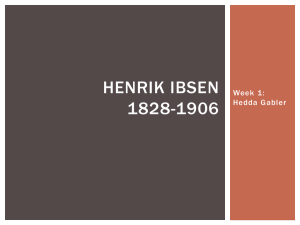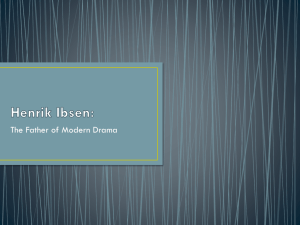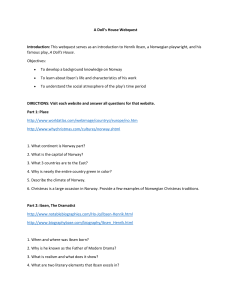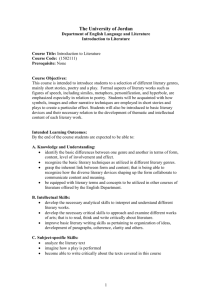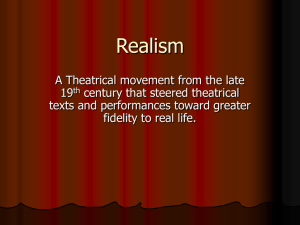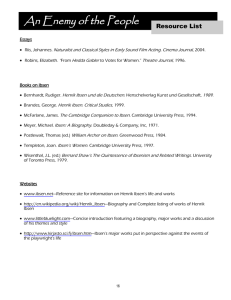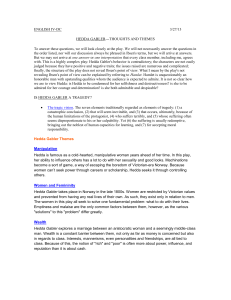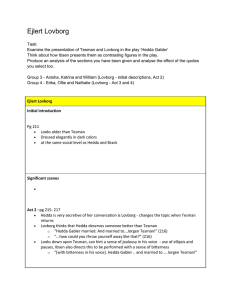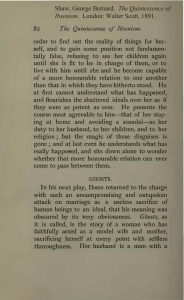Ibsen + Hedda intro
advertisement
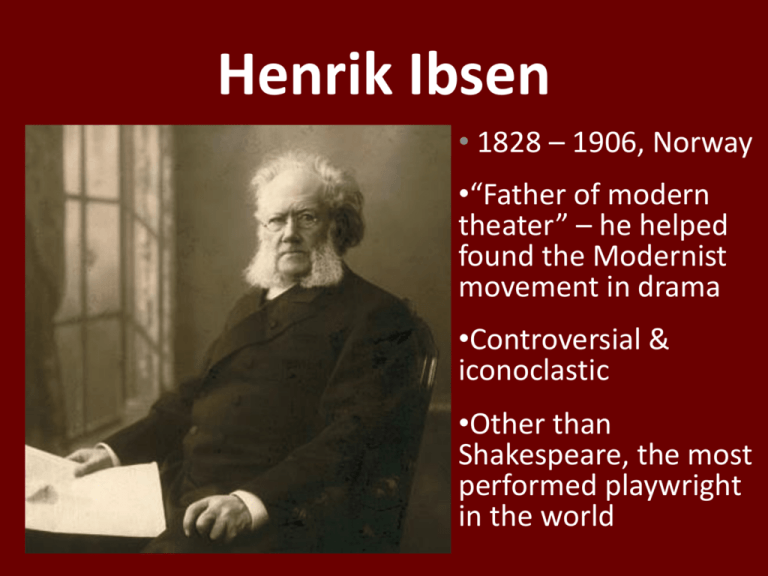
Henrik Ibsen • 1828 – 1906, Norway •“Father of modern theater” – he helped found the Modernist movement in drama •Controversial & iconoclastic •Other than Shakespeare, the most performed playwright in the world Victorian Era: Although the term “Victorian” refers to Great Britain from the 1830’s to 1901 (during Queen Victoria’s reign), the strict moral values of the time were exported to continental Europe and influenced society and culture around the world. Victorian Interiors From “Ibsen and His Discontents” by Theodore Dalrymple The scale of Ibsen’s achievement is astonishing. Almost single-handedly, he gave birth to the modern theater. Before him, the nineteenth century, so rich in other literary forms, produced hardly a handful of plays that can still be performed, and the literary power of his work has never since been equaled. It was he who first realized that mundane daily life, relayed in completely naturalistic language, contained within it all the ingredients of tragedy. That he should have transformed the whole of Western drama while writing in an obscure language that was considered primitive—and that he should have produced in 20 years more performable plays than all the British and French playwrights of his era put together, despite their incomparably longer and richer theatrical traditions—is almost miraculous. Though Ibsen often claimed to be a poet rather than a social critic, lacking any didactic purpose, the evidence of his letters and speeches (quite apart from the internal evidence of the plays themselves) proves quite the opposite—that he was almost incandescent with moral purpose. Contemporaries had no doubt of it; and the first book about him in English, Bernard Shaw’s Quintessence of Ibsenism, published in 1891 while Ibsen still had many years to live and plays to write, stated forthrightly that his works stood or fell by the moral precepts they advocated. Shaw thought that Ibsen was a Joshua come to blow down the walls of moral convention. I think this judgment is wrong: Ibsen was far too great a writer to be only a moralist, and it is possible still to read or watch his plays with pleasure and instruction, without swallowing what he has to say hook, line, and sinker. Hedda Gabler: 1891 “The original desperate housewife” Neurotic Hedda: Foreshadowing Freud Joseph Wood Krutch makes a connection between Hedda Gabler and Freud, whose first work on psychoanalysis was published almost a decade later. Hedda is one of the first fully developed neurotic heroines of literature. By that Krutch means that Hedda is neither logical nor insane in the old sense of being random and unaccountable. Her aims and her motives have a secret personal logic of their own. She gets what she wants, but what she wants is not anything that the normal usually admit, publicly at least, to be desirable. One of the significant things that such a character implies is the premise that there is a secret, sometimes unconscious, world of aims and methods — one might almost say a secret system of values - that is often much more important than the rational one. Works cited: • http://upload.wikimedia.org/wikipedia/commons/c/cf/ Ibsen-by-Bergen.jpg • http://www.earthlydelights.com.au/victorian.htm • http://gallery.nen.gov.uk/imagelarge94643-e2bn.html • http://en.wikipedia.org/wiki/Henrik_Ibsen • http://www.city-journal.org/html/15_3_urbanitiesisben.html • http://www.smh.com.au/news/arts/cate-reels-themin/2006/02/27/1141020023979.html?age=fullpage • http://en.wikipedia.org/wiki Hedda_Gabler#cite_note2

